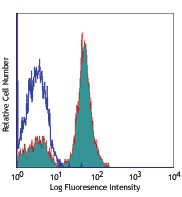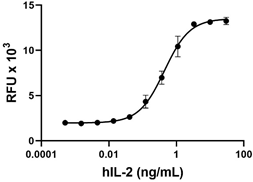- Regulatory Status
- RUO
- Other Names
- CSF1, CSF-1, MCSF
- Ave. Rating
- Submit a Review
- Product Citations
- publications
| Cat # | Size | Price | Quantity Check Availability | Save | ||
|---|---|---|---|---|---|---|
| 716602 | 10 µg | $253 | ||||
This product is not available for shipping outside of the United States.
M-CSF was first characterized as a glycoprotein that induces monocyte and macrophage colony formation from precursors in murine bone marrow cultures. M-CSF is constitutively present at biologically active concentrations in human serum. It binds CD14+ monocytes and promotes the survival/proliferation of human peripheral blood monocytes. In addition, M-CSF enhances inducible monocyte functions including phagocytic activity, microbial killing, cytotoxicity for tumor cells as well as synthesis of inflammatory cytokines such as IL-1, TNF-α, and IFN-γ in monocytes. M-CSF induces RANKL production in mature human osteoclasts; consequently, M-CSF is a potent stimulator of mature osteoclast resorbing activity. Also, M-CSF induces VEGF in monocytes in human tumors. High levels of M-CSF, mononuclear phagocytes, and VEGF are associated with poor prognosis in patients with cancer. High levels of M-CSF have been associated with different pathologies such as pulmonary fibrosis and atherosclerosis. M-CSF binds to its receptor M-CSFR, and this receptor is shared by a second ligand, IL-34. Human M-CSF and IL-34 exhibit cross-species specificity, both bind to human and mouse M-CSF receptors.
Product DetailsProduct Details
- Source
- Human M-CSF, amino acids Glu33-Ser190 (Accession# NM_172212.2) with N terminus Met was expressed in E. coli.
- Molecular Mass
- The 159 amino acid N-terminal methionylated recombinant protein has a predicted molecular weight of 18.5 kD. The predicted N-terminal amino acid is Met. Recombinant human M-CSF is a 37 kD homodimeric protein.
- Purity
- >98%, as determined by Coomassie stained SDS-PAGE and HPLC analysis.
- Formulation
- Lyophilized, carrier-free.
- Endotoxin Level
- Less than 0.1 ng per µg of protein.
- Storage & Handling
- Unopened vial can be stored at -20°C or -70°C. For maximum results, quick spin vial prior to opening. Reconstitute in water to a concentration of 0.1-1.0 mg/ml. Do not vortex. It is recommended to further dilute in a buffer, such as 5% Trehalose, and store working aliquots at -20°C to -80°C. Avoid repeated freeze/thaw cycles.
- Activity
- ED50 is ≤ 1.0 ng/ml, corresponding to a specific activity of ≥ 1.0 x 106 units/mg as determined by the dose-dependent stimulation of the proliferation of murine M-NFS-60 cells.
- Application
-
Bioassay
- Application Notes
-
This product is reactive with human, monkey, mouse, and rat.
Antigen Details
- Structure
- Growth factor, Disulfide-linked glycosylated homodimer
- Distribution
- M-CSF is broadly expressed in adult mouse tissues. M-CSF is released by fibroblasts, breast cancer cell lines, alveolar macrophages, stromal bone marrow cells, endothelial cells, and mesenchymal cells.
- Function
- M-CSF is the key regulator of the survival, proliferation, and differentiation of mononuclear phagocytes and plays a central role in the regulation of osteoclastogenesis. CSF-1 also regulates the development of Paneth cells, Langerhans cells, lamina propria dendritic cells, and microglia.
- Interaction
- Monocytes, macrophages, mononuclear phagocyte precursors, microglia, proliferating smooth muscle cells, umbilical vein endothelial cells, and breast cancer cell lines.
- Ligand/Receptor
- M-CSFR or CSF1R (CD115)
- Bioactivity
- Human M-CSF is able to induce proliferation of mouse M-NSF-60 cells.
- Cell Type
- Hematopoietic stem and progenitors, Embryonic Stem Cells
- Biology Area
- Cell Biology, Cell Proliferation and Viability, Immunology, Stem Cells
- Molecular Family
- Growth Factors, Cytokines/Chemokines
- Antigen References
-
1. Kawasaki ES, et al. 1985. Science 230:291.
2. Wei S, et al. 2010. J. Leukoc. Biol. 88:495.
3. Hodge JM, et al. 2011. PLoS One 6:e21462.
4. Morandi A, et al. 2011. PLoS One 6:e27450.
5. Erblich B, et al. 2011. PLoS One 6:e26317.
6. MacDonald KP, et al. 2010. Blood 116:3955. - Gene ID
- 1435 View all products for this Gene ID
- UniProt
- View information about M-CSF on UniProt.org
Related FAQs
- Why choose BioLegend recombinant proteins?
-
• Each lot of product is quality-tested for bioactivity as indicated on the data sheet.
• Greater than 95% Purity or higher, tested on every lot of product.
• 100% Satisfaction Guarantee for quality performance, stability, and consistency.
• Ready-to-use liquid format saves time and reduces challenges associated with reconstitution.
• Bulk and customization available. Contact us.
• Learn more about our Recombinant Proteins. - How does the activity of your recombinant proteins compare to competitors?
-
We quality control each and every lot of recombinant protein. Not only do we check its bioactivity, but we also compare it against other commercially available recombinant proteins. We make sure each recombinant protein’s activity is at least as good as or better than the competition’s. In order to provide you with the best possible product, we ensure that our testing process is rigorous and thorough. If you’re curious and eager to make the switch to BioLegend recombinants, contact your sales representative today!
- What is the specific activity or ED50 of my recombinant protein?
-
The specific activity range of the protein is indicated on the product datasheets. Because the exact activity values on a per unit basis can largely fluctuate depending on a number of factors, including the nature of the assay, cell density, age of cells/passage number, culture media used, and end user technique, the specific activity is best defined as a range and we guarantee the specific activity of all our lots will be within the range indicated on the datasheet. Please note this only applies to recombinants labeled for use in bioassays. ELISA standard recombinant proteins are not recommended for bioassay usage as they are not tested for these applications.
- Have your recombinants been tested for stability?
-
Our testing shows that the recombinant proteins are able to withstand room temperature for a week without losing activity. In addition the recombinant proteins were also found to withstand four cycles of freeze and thaw without losing activity.
- Does specific activity of a recombinant protein vary between lots?
-
Specific activity will vary for each lot and for the type of experiment that is done to validate it, but all passed lots will have activity within the established ED50 range for the product and we guarantee that our products will have lot-to-lot consistency. Please conduct an experiment-specific validation to find the optimal ED50 for your system.
- How do you convert activity as an ED50 in ng/ml to a specific activity in Units/mg?
-
Use formula Specific activity (Units/mg) = 10^6/ ED50 (ng/mL)
 Login/Register
Login/Register 












Follow Us